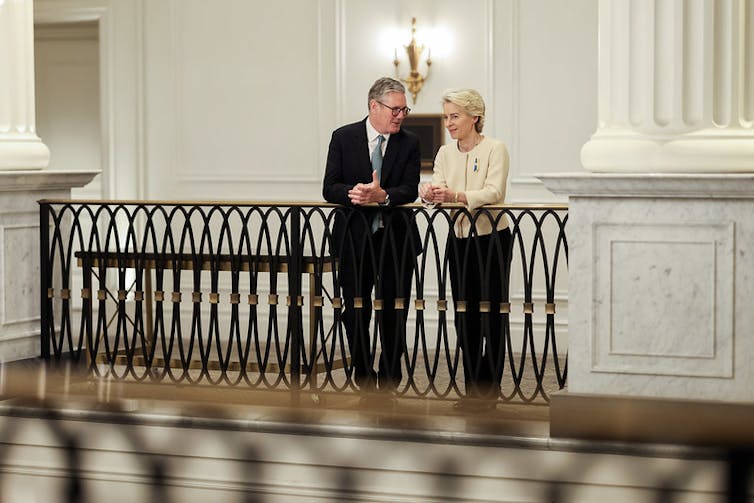Much is made of the alleged state of Bregret – the idea that even those who voted for Brexit now regret their decision. It is true that a majority (54%) now think Britain was wrong to vote to leave the EU. According to a YouGov poll, 62% of people think Brexit has been more of a failure than a success. We even know that 18% of leave voters would now vote remain if they could have another go at the 2016 referendum.
But conjuring up the past is a logical impossibility. A “rejoin” option would not be the same as the “remain” option. The European Union would have understandable hesitations about readmitting the UK without greater commitments than in the past – and might, for example, expect the UK to join the euro.
Want more politics coverage from academic experts? Every week, we bring you informed analysis of developments in government and fact check the claims being made.
Sign up for our weekly politics newsletter, delivered every Friday.
When studying attitudes towards rejoining the EU, it quickly becomes apparent that voters see this clearly. The feeling of having made one’s bed and now having to lie in it is quite widespread.
When polled about a potential referendum on rejoining the EU, only 48% of the UK public solidly supported it. When asked if they would rejoin were monetary union to be on the table, support for rejoin dwindles to 34%, showing just how conditional support for rejoining actually is.
The rejoin option is particularly polarising. It drives leave and remain voters further apart than any other option.
And no-one wants to re-hash Brexit divisions: the issue has fallen precipitously in terms of salience (from its heights of nearly 70% in the negotiations period, to a mere 12% today). The public doesn’t want to touch the subject of Brexit with a barge pole – and it should come as no surprise that the current UK government doesn’t want to either. The current public mood is more one of bresignation than bregret.
Both leavers and remainers are in an impossible bind. They recognise that the process of leaving the EU was very far from the pipe dream sold by the Leave campaign but neither can do anything about it.

For leavers, the idea that Brexit was a mistake triggers discomfort. They are in what behavioural scientists call a state of cognitive dissonance. When we cannot change a past action, we often decide to change how we see and interpret new evidence about that action in order to avoid the cognitive inconsistency and the psychological discomfort of being wrong about it.
This is natural and human, it happens to all of us. Together with my colleague Sara Hobolt, I have shown how since the 2016 vote, both remainers and leavers have chosen to retain and believe different aspects of official information on the state of the UK economy to suit their own view on Brexit.
For leavers, this means joining the 47% who think that Brexit is not done, or the nearly 30% who think it could have been a success if the UK had better politicians and negotiators.
These numbers are not negligible: any call for rejoining the EU is, at this point in time, unwise and likely to be seen as extremely radical.
The big reset
To overcome this state of “bresignation” and truly trigger a reset in UK-EU relations, the UK government first needs to gather information on how the current arrangement - the Trade and Cooperation Agreement - is going, and to communicate this evidence in a unifying way.
Some evidence shows that factual information about Brexit effects (e.g. economic repercussions, repercussion on young UK citizens of the end of freedom of movement), or lack thereof (for example, illegal immigration issue not being “solved” by Brexit), are getting across to the UK public.
Commissioning more research on how minimal access to the EU market is affecting the UK economy – and disseminating this evidence in a way that does not point the finger at leave voters – is an essential step. They need to be protected from feeling primarily responsible to be shielded from the state of cognitive dissonance.
Given that it was the responsibility of the Leave and Remain campaigns to clearly spell out the meaning of Brexit, freeing leave voters from blame is also simply the right thing to do.
Public opinion is still very much in favour of retaining control over UK regulations and trade deals, making joining the customs union and single market particularly unpalatable. But there is significant support for a closer relationship with the EU and for the removal of most – if not all – trade barriers on goods and services.
There is, therefore, scope to sell regulatory alignment by focusing on its flexible, conditional nature and on the perks of easing trade with the world’s largest trading block.
People are also less fussed about conditional freedom of movement than the government thinks. They favour flexible immigration quotas to dynamically deal with sectoral shortages, such as in the NHS, or for high-skilled talent.
A reset is in the realms of possibility, therefore. But the UK government first needs to break us free from the state of bresignation.
Miriam Sorace does not work for, consult, own shares in or receive funding from any company or organisation that would benefit from this article, and has disclosed no relevant affiliations beyond their academic appointment.
This article was originally published on The Conversation. Read the original article.







